Local News
Japanese author Akira Kitade recounts for Winnipeg audience role of foreign diplomats in saving Jewish lives in WWII
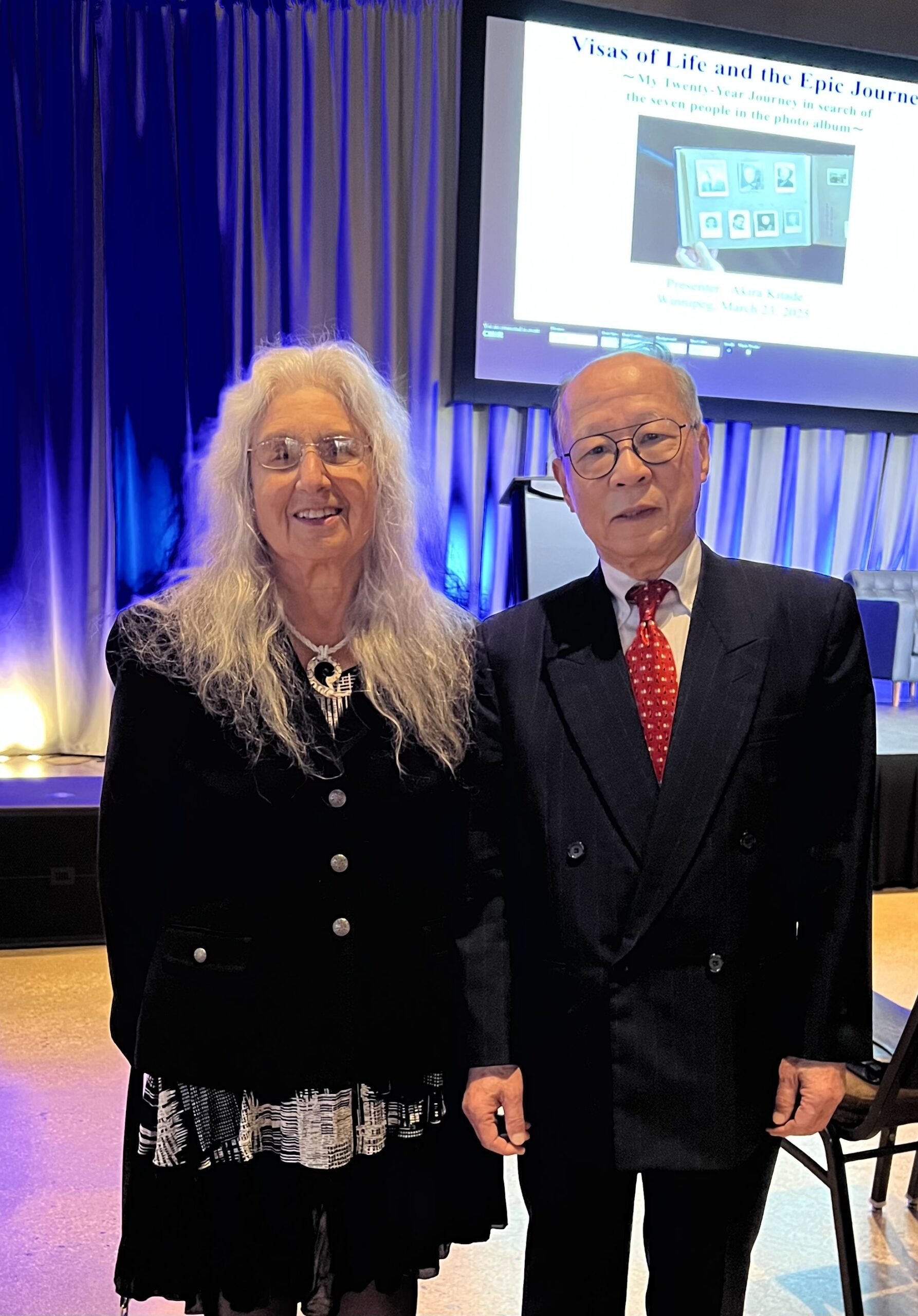
By MYRON LOVE One of the lesser known histories of the Holocaust was the role of various diplomats who saved thousands of Jewish lives through issuing visas to endangered Jews desperate to escape Nazi-occupied Europe. The best known of those diplomats was Raoul Wallenberg, the Swedish special envoy in Budapest in 1944 who issued Swedish passports to thousands of Hungarian Jews and – with the financial support of American Jewish organizations – hid them in numerous safe houses throughout Budapest.
Sadly, he himself met a tragic fate. When the Soviets liberated Budapest in late 1944, the courageous Swede was arrested, shipped back to Russia – and never seen again.
Lesser known diplomats also pitched in to save Jewish lives. One of these Holocaust heroes was Chiune Sempo Sugihara. Japanese consul in Kovno, Lithuania, who provided thousands of Japanese transit visas to Jewish refugees who had fled from Poland and elsewhere in Europe to the Baltic capital city in a desperate effort to escape the clutches of the Nazis.
On Sunday, March 23, about 100 individuals, largely from the Jewish and Japanese communities, were in attendance at the Canadian Museum for Human Rights for a special presentation by Japanese author Akira Kitade describing Sugihara’s exploits.
The story is a central element in Kitade’s most recent book, “Emerging Heroes: World War II Era Diplomats, Jewish Refugees and escape to Japan”, which was a sequel to his previous book, “Visas of Life and the Epic Journey:How the Sugihara Survivors Reached Japan.”
The program, a joint venture between the CHHR and the Jewish Heritage Centre of Western Canada, began with remarks by Takehiko Wajima, the Japanese Consul General in Calgary. (Local immigration lawyer Ken Zaifman, Japan’s honorary consul in Winnipeg, was also in attendance.)
Belle Jarniewski, the Jewish Heritage Centre’s executive director, then set the table, so to speak, for the guest speaker. She pointed out that “the medal awarded to those recognized as Righteous Among the Nations by Yad Vashem, Holocaust Martyrs’ and Heroes’ Remembrance Authority features the inscription – from the Mishnah (Sanhedrin 4:5), “Whosoever saves a single life, saves an entire universe.” Yad Vashem explains further that the quote is particularly appropriate when we think of the survivors and their many descendants and their many contributions to society. Chiune Sugihara did not save a single life – he saved thousands”.
She recounted that when the Nazis attacked Poland, some 15,000 Jews fled eastward, including to the then still independent Lithuania, which had been a centre for Jewish life since the 14th century. Caught between the Nazis and the Soviets, the Jews desperately sought ways to emigrate. After the annexation of Lithuania by the Soviets in the summer of 1940, all foreign diplomats were ordered to leave by August 9.
By then, the Jews were in very dire straits and could find no safe haven. Jan Zwartendijk, a Dutch consul in Kaunas at the time, agreed to stamp thousands of Jewish passports to visa-free Dutch Curacao, a Dutch colony in the Caribbean. The visas were, of course, bogus. With Europe engulfed in war, the only plausible means of escape was across the Soviet Union. For this, the refugees required transit visas showing Japan as their final destination.
As Sugihara and his family were packing their belongings, a delegation of Jews came to him with a desperate request for transit visas. They were led by Zerach Warhaftig – a Jewish refugee who, years later, was to become a minister in the government of the State of Israel. Seeing the desperation of the refugees, Sugihara began issuing the transit visas despite objections from Tokyo. Overall, he issued approximately 2140 transit visas—some of them for entire families.
The refugees rode the TransSiberian railroad across Russia to the Pacific port of Vladivostok. From there, they were transferred by boat, the Hikawa Maru, to Kobe in Japan. Many of the refugees were able to move on from Kobe to the United States and other places. The remainder – about 1,000 – were eventually relocated to the foreign quarter in Japanese-occupied Shanghai, where there was an existing community of German-Jewish refugees and a small number of prosperous Jewish merchant families from India.
Akira Kitade’s interest in Sugihara and the Jewish refugees, he noted, was sparked almost 30 years ago when he heard the firsthand account from Tatsuo Osaka, his boss at the Japanese Tourist Bureau, – who captained the Hikawa Maru carrying Jewish refugees from Vladivostok to Kobe. The retired diplomat recalled that, during a visit in the late 1990s, Osaka showed him an album with photos of eight of the refugees – one man and seven women – along with words of gratitude in various languages representing the many different European countries from which they were fleeing. After Osaka’s passing on 1993, his daughter gave Kitade the album.
His initial goal, the author recalled, was to find out what became of the individuals in the album. Over the next 10 years or so, he accomplished this mission. He shared with his audience at the CMHR what he learned about each of the survivors. All of them eventually reached America ,where they enjoyed successful careers and lives. Most married and had children.
Kitade’s research into the lives of the eight survivors in the album brought into contact with many more Sugihara transit visa holders and their descendants. He noted that while there are estimates that as many as 6,000 refugees – individual and family members, were saved by the Japanese consul’s actions, his view is that the real number is about 3,000. Their descendants, he suggested, are around 50,000.
The author also spoke about three European diplomats who aided Sugihara in facilitating the further movement of the transit visa holders. The problem for the refugees once they landed in Kobe was that the visas were only good for 14 days. Jan Zwartendijk, a Dutch businessman and diplomat, who was director of the Phillips factories in Lithuania and part-time acting consul of the Dutch Government in exile, provided 2,345 visas for Jewish refugees for the Dutch colony of Curacao, an island in the Caribbean.
Nicolaas Arie Johannes (Niek) de Voogd was the Dutch consul in Kobe at that time, and he also provided visas for Jewish refugees for Curacao. De Voogd returned to Japan as the Dutch ambassador in the early 1960s.
Tadeusz Romer was the Polish ambassador in Japan until the Polish embassy in Japan closed in July 1941. From August 1940 to November 1941, he otained transit visas in Japan, arranged asylum visas to Canada and other countries, immigration certificates to Palestine, and immigrant visas to the United States and some Latin American countries for 2,000 Polish-Lithuanian Jewish refugees who had arrived in Kobe. He created a ‘Polish Committee to Aid the Victims of War’ and appointed his wife, Zofia, to be president of the committee. They worked to financially support Jewish communities in Yokohama and Kobe by campaigning in Far Eastern countries for funding.
Belle Jarniewski completed the Sugihara narrative. The diplomat himself was posted to a number of different places, but in 1944 he was arrested by the Soviets along with a number of other diplomats. He was ultimately released, went to work for the Japanese Foreign Service in 1947, and held a variety of other jobs after that. Shortly before his death, Yad Vashem, the Holocaust Martyrs’ and Heroes’ Remembrance Authority in Israel, declared Sugihara “Righteous Among the Nations” for his aid to the refugees in Lithuania during World War II. Yad Vashem conferred the title in 1984, honoring the former Japanese consul with a ceremony in Jerusalem in January 1985.
“The number of people recognized as Righteous Among the Nations – is staggeringly small when you consider the six million Jewish men, women, and children who were murdered,” Jarniewski pointed out.. “However, the impact of the Righteous – those who mustered extraordinary courage and who acted with conscience and caring is immeasurable. Today, the global Jewish community finds itself facing a sustained resurgence of antisemitism unprecedented since the end of the Holocaust. The silence of far too many we had considered as friends and allies has been shocking. We need to see the kind of courage of conscience that Chiune Sugihara so inspiringly displayed.”
One final note. Towards the end of the program, it was noted that in the audience was Winnipegger Rochelle Zucker, whose father, Meyer, was one of the Sugihara survivors. In answer to a question as to how the Jewish refugees in Shanghai survived, she spoke of her own father’s story. As with most of the refugees, they found work. Meyer Zucker was a printer by trade and was hired by a British-owned printing company. After the war, he, like most of the others, applied to go wherever he could. He had a cousin in Calgary who was able to bring him to Calgary to work in the printing industry. In Calgary, he met his wife, Miriam Pearlman, and, in 1948, they moved to Winnipeg where Meyer and Miriam both had family. In Winnipeg, Zucker worked as a printer for the Israelite Press/Yiddishe Vort until just a couple of years before his passing n 1977.
Local News
New Israeli restaurant opens in River Heights

By BERNIE BELLAN (July 6, 2025) It’s been a long time since our community has been able to welcome the opening of a restaurant that specializes in Israeli food.
That void is now going to be filled with the opening of The Green Falafel, at 1833 Grant (corner of Centennial – next to the Subway).
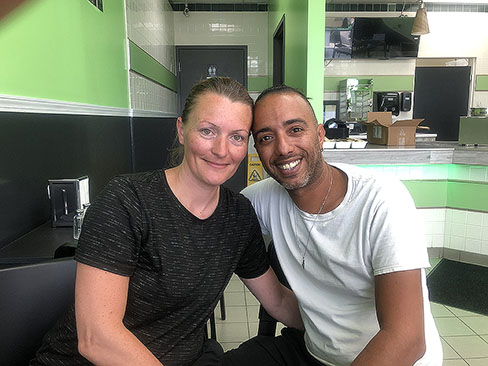
The restaurant is the fulfillment of a dream long held by the husband and wife team of Ariel and Eden Maudi, who have been living in Winnipeg the past 11 years.
Ariel, who was born in Israel and grew up in Beer Sheva, says that he worked in telecommunications in Ramat Gan for several years. He adds though that he had always dreamed of owning his own falafel stand in Israel, but life was difficult there and he decided to come to Canada as a tourist to see whether there were any opportunities here for him, Eden and their two young children.
Eden, who was born in Russia and moved to Israel with her family in 1996, stayed behind with the two kids, who were both pre-schoolers, while Ariel tested the waters in Canada first.
Ariel says he came to Canada as a tourist in 2013. His first stop was in Toronto, where he acquired his 1st class driver’s license. At the end of 2013 he moved to Winnipeg where he began working as a truck driver. Soon he found himself employed as a successful sales person at Vickar Nissan where, he says, he once achieved the status as the top car sales person in Canada. After working at Vickar Nissan for a number of years, Ariel began working as an installer for Bell MTS.
Meanwhile, Eden began working at a Walmart, later at the Costco on Regent.
But, when the opportunity to move into a space that had been previously occupied by another restaurant, but which had closed, became available, Ariel and Eden decided to open their own Israeli restaurant in an area that hadn’t seen Israeli food served since the controversial closure of Bermax Café in 2019.
The Maudis say that they will be serving a variety of Israeli dishes – all vegetarian, and that they will be fully kosher.
The “green” in Green Falafel, by the way, Ariel Maudi explains, comes from the cilantro and parsley that are added to the chickpeas. In addition, their pitas will be coming from Israel and will be baked fresh daily.
The Green Falafel will be open from 10-8 daily. Delivery will be available through Uber Eats and DoorDash.
Call 204-557-7837 for information.
Local News
Previews of shows with Jewish performers at this year’s Fringe Festival July 16-27

For show dates and venues go to winnipegfringe.com
By BERNIE BELLAN As has been our custom for many years now we try to find shows that have either Jewish performers or themes that would have particular appeal for Jewish audiences. Many of the Jewish performers at this year’s festival have been here before, but several are new. In no particular order here are blurbs about the shows we’ve found that fit the criteria I’ve just described. (By they way, if we’ve omitted a show that should be included in our list there’s plenty of time to get added to this post. Just drop me a line at jewishp@mymts.net.)

You’ve Been Served: A One-Woman Show About Divorce, Cults, and Coming of Age at Midlife
Noemi Zeigler
You are hereby summoned… to laugh, cry, and maybe belt out a Streisand number in solidarity. You’ve Been Served is a raw and riotous solo comedy by writer-performer Noemi Zeigler. It all begins when Noemi is served divorce papers on top of a garbage bin lid while taking out the trash—an undignified start to a full-blown midlife unraveling.
At 50, still clinging to her dream of becoming a singer, she falls under the spell of a music producer slash self-help guru, joins a spiritual cult, and, instead of landing a record deal, she lands in jail. Behind bars, with help from her long-buried inner child, she begins to reclaim her voice and her power. Turns out, dreams really do come true—just not the way she expected.
The show features vividly drawn characters—including a manipulative cult leader, a toxic ex-husband, and a jail guard named Roach who shares Noemi’s obsession with the fashion of Charlie’s Angels (the ‘70s TV version, of course.)
With salsa dancing, twerking, and a belting rendition of Don’t Rain on My Parade, Zeigler dives into abandonment, reinvention, and self-rescue. As she confronts perimenopause, she discovers it’s not the end—it’s the new puberty. The show touches on grief, sexuality, and spiritual confusion, but Noemi’s childlike optimism asks: What if your breakdown is actually your breakthrough?
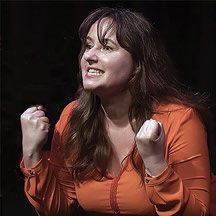
You’re good for nothing… I’ll milk the cow myself
Written & Performed by Natacha Ruck
France, 1981: The first socialist president is about to be elected and young Natacha is ready to implement her own political platform. But first, she has to take down the schoolyard bully,emasculate the rules of French grammar and make off with grandmother’s chocolate.
If you think you know the limits of Jewish mothers, evil grandmothers and transcontinental lovers, meet Natacha Ruck’s family. This true tale of three generations of women, facing three world wars, is equal parts hilarious, shocking and zany.
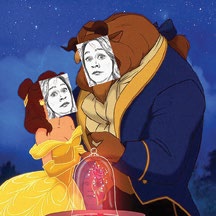
A One Human Being, Potentially Comedic Performance of Beauty and the Beast NEW WORK!
Written & Performed by Alli Perlov
Be our guest! Local high school drama teacher Alli Perlov is back for a tale as old as time. Can she sing? Not really. Can she act? That’s debatable. Will you laugh? Oh… probably.
Perlov plays dozens of characters, some human, some animal, and many objects, in a comedic exploration of Beauty and the Beast.
In an homage to this brilliant musical adventure, through witty commentary and unstoppable energy, Perlov aims to entertain an audience that isn’t forced to be there like her students.

Hockey Sticks and Beaver Pie
Written & Performed by Melanie Gall
Take a trip around Manitoba. From the 30,000 ft. St. Adolphe snow maze to the Narcisse snake dens! After all, where else holds both the title of Slurpee Capital of the World and the Guinness Record for the most people simultaneously howling like wolves?
Deanna Durbin, Terry Jacks and Burton Cummings are among the many homegrown stars, and Hockey Sticks features their music along with original songs and the stories that make this province unique.
Starring Melanie Gall from past shows Piaf & Brel, Ingenue and Toast to Prohibition
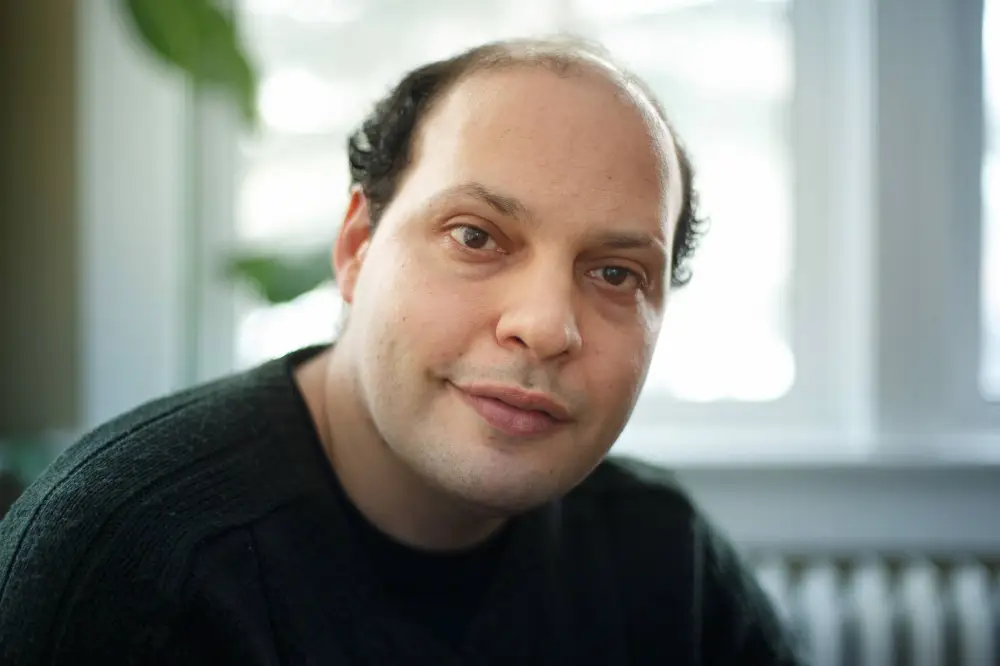
Nerohilarity Exposed
Produced by Adam Schwartz
We all sometimes feel exposed, whether that’s as a fraud or a pretender.
The performers of the award-winning Neurohilarity show, Danielle Kayahara (Laugh Out Loud CBC), Carole Cunningham (Yuk Yuks, The Debaters), Adam Schwartz (Winnipeg Fringe) and Rollin Penner (Yuk Yuks, CBC, Rumors, Winnipeg Comedy Festival), apply a comedic spin to the experiences that make us feel insecure, stripping away the emotional weight with nittygritty jokes and stories that will have you laughing uproariously.
Brilliantly awkward.

A Lesbian in the Kitchen
Willow Rosenberg
Professional lesbian Willow Rosenberg takes you on a journey through the centuries, superstitions and tablespoons of her lifelong passion for baking in this spiritual successor to 2024’s Jenny Award-nominated A Lesbian in a Bear Store.
Whether you have a favourite spatula, bake once or twice a year, or live in constant fear of being told to “just fold it in”, this one-woman show about family, joy, tradition (but make it gay),
Judaism, comfort, home (but make it gayer*), love, chemistry and magic is for you!
*Who’re we kidding, it’s all gay!

Eleanor’s Story: An American Girl in Hitler’s Germany
Written & Performed by Ingrid Garner
(Ed. note: Although Ingrid Garner isn’t Jewish, we thought the theme of this show might have a special appeal for Jewish readers.)
Based on Eleanor Ramrath Garner’s best-selling memoir, this 16x internationally award-winning adaptation – performed by her granddaughter, Ingrid Garner – details Eleanor’s youth as an American caught in Second World War Berlin.
Punctuated with humour and accompanied by cinematic sound and video, Garner embodies her ancestors in this coming-of-age odyssey, delivering an account of war that is more relevant than ever.
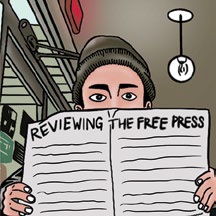
Reviewing The Free Press 2
Benji Rothman
The Winnipeg Free Press has run amok, reviewing each and every Fringe show over the past two decades without consequence or recourse. Now, it’s their turn… again.
In this refurbished work that debuted at last year’s Winnipeg Fringe, Benji Rothman once again takes the Winnipeg Free Press to task. In this (mostly) new, (hopefully) hilarious 45-minute show, Rothman dives deep into their past and exposes their faulty journalism, imbalanced reporting and, of course, embarrassing typos.
Local News
Jewish performers at this year’s Winnipeg Folk Festival July 10-13

The Black Sea Station
Long ago, there were the klezmorim, itinerant musicians who roamed the back streets of Eastern Europe, playing at parties for meals and a few coins. The sound they honed then was a visceral exploration of life’s joy, and its loss; they could whip audiences into a frenzy of dancing, or bring them to tears with the mournful wail of a clarinet. Today, Winnipeg’s own The Black Sea Station is carrying on this tradition. Featuring Daniel Koulack (bass), Victor Schultz (violin) and Myron Schultz (clarinet) — cofounders of seminal local klezmer act Finjan — along with Moldovan accordion wizard Nikolai Prisacar and multi-instrumentalist Ben Mink, the quintet transports listeners to a time and place long past. Through a mix of original songs rooted in history, and traditional tunes spun up with modern zest, they whirl through the exuberant klezmer sounds of their Eastern European heritage, tending the old ways with deep love and respect.
The Black Sea Station will be performing Sunday, July 13, at 1:00 pm in Snowberry Field.
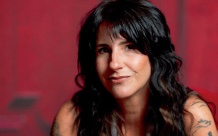
Romi Mayes
Romi Mayes has taken some hard knocks in her life, but she’s never faded away. For more than 25 years, Manitoba’s first lady of blues-rock has been a lynchpin of the Canadian roots scene. She earned that position the old-fashioned way, through her gritty, passionately emotive music. With her sizzling guitars and full-throated rasp, the Juno-nominated performer howls and purrs through razor-edged lyrics, rocking out wherever she can find a stage. She’s long been one of the hardest-working musicians on the circuit, keeping a busy slate of gigs and mentoring up-and-coming artists to get a foothold on the trails she blazed. Now, after a nine-year hiatus from the studio, Mayes has put her scintillating sound back on record with her long-awaited seventh album, Small Victories — a return that leaves no doubt, no matter the ups and downs, Mayes is here to stay.
Romi will be performing Friday, July 11, at 1:00 pm in Burr Oak.

Leonard Podolak (with Matt Gordon)
Ireland’s Matt Gordon is a fiddler and singer, whose fleet-footed clogging and thigh-slapping hambone has taken stages by storm since the 1980s. Leonard Podolak is a virtuosic master of the clawhammer banjo, who for decades has whipped up some of Manitoba’s wildest roots parties with his band, The Duhks. Put those talents together, and they can promise you this much: we’re all gonna have a real good time. Longtime friends and musical collaborators, Gordon and Podolak deliver an exhilarating trip through old-time Appalachian music. Their performances seamlessly blend intricate instrumental lines with heartfelt singing and dazzling dance. They’ve teamed up on a few records over the years, including 2020’s bigband extravaganza Power Wagon: Live At Shanley’s. But the best way to experience this duo’s toe-tapping, hand-clapping chemistry is to see it live.
Podolak and Gordon will be performing A concert with a side of clogging Sunday, July 13, at 3:00 pm in Folk School.
